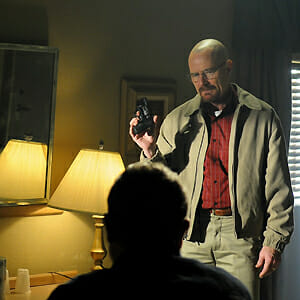Breaking Bad: Episode 4.1

Unlike other television dramas that have an anti-hero protagonist, Breaking Bad doesn’t rely on a crutch to give you permission to like and root for the villainous main character. Take for instance Dexter. The blood splatter expert/serial killer lives by his own moral code. He generally only kills those that “deserve to be killed”. In other words, he preys on those that prey on the innocent. The fact that Dexter kills other terrible people gives the audience a free pass to root for him and the violent things that he does without feeling morally compromised.
Breaking Bad started out similarly. Walter White was a middle class teacher, diagnosed with lung cancer. With bills and debt piling up and only months left to live, he decides to cook meth to provide for his family after he checks out. This is the crutch I mentioned above—our excuse to root for Walt, despite his actions being terrible. But something happened—the writers kicked the chair out from underneath us. When Walter said in season one “I am awake,” he wasn’t kidding. While his motivations at the time seemed like they were for his family, the truth is, that was simply Walter’s self-justification. Death set Walter White free. Violence set him free. Breaking Bad in a lot of ways is the story of someone not only having to face what they truly are, but having the opportunity to have that kind of personal revelation. And for our protagonist, that is being a criminal that feeds off power and control. Since Walter’s goals have changed, it’s now less about a man doing terrible things for the sake of his family, as it’s about a man that loves power and defying authority—and embracing it.
You could not have done a show like_Breaking Bad_without this kind of progressive revelation—without “kicking the chair out from underneath us.” We are so deeply invested in Walt that he can seemly do anything and we would still be rooting him. Just like Walter White, we are so deep into it, there is no looking back. I can’t think of too many shows where the protagonist does so many terrible things, especially to those around him, and yet we want him to go even further. This meticulous process every season has made Walt’s slow transformation believable. It’s also allowed the audience to ease into it. In season three, Walt had moved on to bigger things. Gone were the days of traveling in a beat up Winnebago to cook meth out in the desert. Now he was cooking in a professional lab secretly built under a cleaning supply center. His employer was a stable, a professional, who even owned a major chicken restaurant chain and knew how to do business without the violence. And yet, Walt still seemed to get into trouble by the season’s end. Walt’s Achilles heel is that he still holds on to his characteristics of his past life. He and Jesse might fight a lot, but deep down he loves him as a son, so much so that he was willing to kill for him so that he wouldn’t have to lose his innocence. But in Walt’s final act of desperation soon after this, he called on Jesse to make the ultimate sacrifice, and this is how season three ended, with Jesse having to look into an innocent man’s eyes as he begs for his life and pull the trigger. This of course is the complexity of Walt. He will go out on a limb to save those that he loves, but he will also use those very same people if it’s a means to survive.
-

-

-

-

-

-

-

-

-

-

-

-

-

-

-

-

-

-

-

-

-

-

-

-

-

-

-

-

-

-

-

-

-

-

-

-

-

-

-

-








































